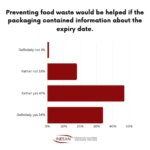
The Power of Proactive Health Behaviors: A Closer Look
7. 11. 2023
Shelf-life information on packaging
15. 11. 2023In the realm of health beliefs, our latest survey has revealed a fascinating contrast in the attitudes of smokers and non-smokers. As we delve deeper into the data, a rich tapestry of insights unfolds, highlighting the intricate dance between smoking habits and personal health beliefs.
For smokers, the statement “No matter what I do, if I am going to get sick, I will get sick” has a mean score of 4.42, while non-smokers lag far behind with a mean score of 4.28 (the higher the score, the stronger the belief). The numbers tell a story of smokers showing slightly stronger agreement with this belief, suggesting that they may have a more fatalistic view of their health.
Non-smokers take the lead with a mean score of 4.62 for agreement with “If I take care of myself, I can avoid illness,” indicating a more robust belief in the power of self-care as a preventive measure against illness. In contrast, smokers scored slightly lower with a mean of 4.45, reflecting a somewhat diminished belief in self-care as a protective shield.
These findings illuminate the rich and diverse tapestry of health beliefs among smokers and nonsmokers. While the differences may appear nuanced at first glance, they open the door to a deeper exploration of the intricate web of health-related attitudes. They invite thoughtful reflection on the subtle but significant interactions between personal behaviors, resulting health outcomes, and the pervasive influence of smoking habits on our perceptions of well-being. This complex interplay underscores that our health beliefs are shaped not only by our individual choices but also by the influence of our broader lifestyle and environmental factors. By unraveling this complexity, we gain insight into how individuals navigate their health journeys and the factors guiding their beliefs.





